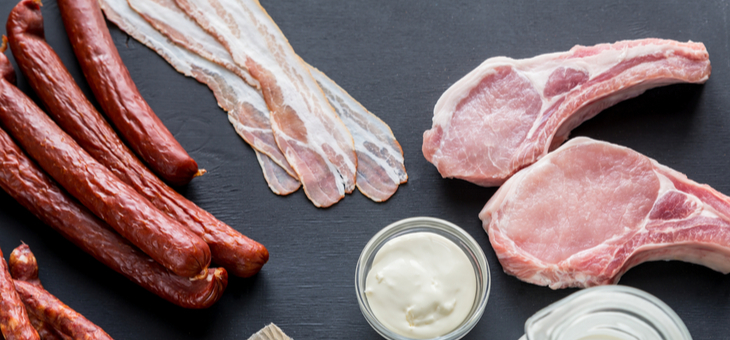How is it that fat got such a bad rap? Is there anything more delicious than potatoes bubbling away in a roasting pan? Or burger juices dribbling down your arm? Or a creme brulee to finish off a celebratory meal?
Fat gives food flavour, fills you up and is essential for health, with most advice now suggesting that a third of our calories come from fat. That wasn’t always the case.
Back in the 1950s, as polio and many other infectious diseases were being defeated, United States public health experts could finally confront a sobering statistic – one in three Americans were dying of coronary heart disease.
Instead of looking at the most obvious culprit, smoking, no doubt due to big tobacco’s deep pockets and political power, doctors were pointing the finger at America’s diet high in meat, dairy and fried food. In other words, animal fats, and the role cholesterol and blood lipids played in heart attacks.
In the late 1950s, physiologist Ancel Keys began one of the longest running and most famous observational studies, comparing diet and rates of heart disease across populations.
Read more: Seven useful facts about fat
His ongoing Seven Countries Study was the first to make the connection between the Mediterranean diet, a term he coined, and low cholesterol. Dr Keys therefore surmised that a diet low in animal fats and high in fish, vegetable, nut and seed fats was the best for long-term heart health.
Problem is, Dr Keys’ study did not follow best-practice methodology and he has been accused of cherry-picking results to suit his theory. For instance, his Seven Countries Study omitted results from France, which has a traditional diet much higher in animal fats than Italy or Greece, but similarly low rates of heart disease.
A controlled clinical trial was needed to solidify Dr Keys’ theory and a colleague, cardiologist Ivan Frantz Jr, came up with a rather unethical, if clever, plan. If he could track and control the exact diets of two groups – one on an animal fat diet, the other on a vegetable fat diet – he would get a much clearer picture of the effect of different fats on heart health.
And so, in 1968, Dr Frantz embarked on his Minnesota study of 9423 residents from six mental hospitals and one nursing home, who were randomised to a control diet high in saturated fat or an experimental diet replacing saturated fat with vegetable oil rich in linoleic acid (corn oil).
Dr Frantz wanted to demonstrate that the vegetable oil diet would lead to lower cholesterol levels and improved health outcomes over time.
Read more: An egg a day?
But the major findings in fact showed that swapping animal fats for industrialised vegetable fats (now known as trans fats) increased mortality. Dr Frantz quietly parked the results in his basement, just as Dr Keys’ theory of animal fats bad, vegetable fats good, was gathering pace.
Dr Frantz’s results were finally released in 1989, when low-fat diets were all the rage and the industrial food complex was packing its products with trans vegetable fats, salt and sugar to replace the rich flavour of fat.
That trend is now considered integral to the staggering rise in obesity, as carbohydrates replaced fats in modern Western diets.
Nina Teicholz, author of The Big Fat Surprise, says animal fats probably do not, after all, have an effect on cardiovascular mortality.
Read more: Weird food fads
“Swapping the naturally occurring saturated fats in animal foods for industrially produced vegetable oils may have been a huge mistake. And the more we know about vegetable oils – their inflammatory effects and tendency to oxidise when heated – should make us reconsider whether this has been a good swap,” she said.
US cardiovascular researcher James DiNicolantonio has the last word: “Eat real food as close to nature as possible, then all of us would be a lot better off.”
Four types of fat explained
Monosaturated: fat molecules that have one unsaturated carbon bond in the molecule – a double bond. Plant-based oils such as olive, canola, peanut and sesame contain monounsaturated fats that are typically liquid at room temperature but start to turn solid when chilled. This is a ‘good’ oil, with high-density lipoprotein (HDL), which is great for the heart.
Polyunsaturated: similar benefits and molecular structure to monosaturated fats, but includes omega-3 and omega-6 fats from fish oil, soybean, seaweed, edamame (the Japanese diet is high in this oil). Also note that Dr Frantz’s corn oil is polyunsaturated before processing.
Saturated: fat molecules that have no double bonds between carbon molecules because they are saturated with hydrogen molecules. Mostly sourced from meat and dairy, this fat is typically solid at room temperature, and has a ‘bad’ tag because it floods the bloodstream with low-density lipoprotein (LDL), the cholesterol that can lead to heart attack and stroke.
Trans: cheap to produce and long-lasting, trans fats are mostly created in an industrial process that adds hydrogen to liquid vegetable oils to make them more solid, so they can be heated repeatedly. They make our fish and chips extra tasty but partially hydrogenated oils are no longer generally recognised as safe for human consumption as they lift LDL cholesterol and lower HDL.
Do you follow a low-fat diet? How does it affect your health? Why not share your experiences in the comments section below?
If you enjoy our content, don’t keep it to yourself. Share our free eNews with your friends and encourage them to sign up.

